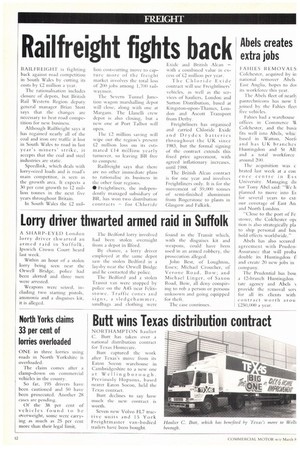Rai!freight fights back
Page 12

If you've noticed an error in this article please click here to report it so we can fix it.
RAILFRE1GHT is fighting back against road competition in South Wales by cutting its costs by £2 million a year.
The rationalisation includes closure of depots, but British Rail Western Region deputy general manager Brian Stott says that the changes are necessary to beat road competition for new business.
Although Railfreight says it has regained nearly all of the coal and iron ore traffic it lost in South Wales to road in last year's miners' strike, it accepts that the coal and steel industries are static.
Speedlink, which deals with lorry-sized loads and is road's main competitor, is seen as the growth area. It expects a 30 per cent growth to 12 million tonnes in the next five years throughout Britain.
In South Wales the 112 mil lion cost-cutting move to capture more of the freight market involves the total loss of 200 jobs among 1,700 railwaymen.
The Severn Tunnel Junction wagon marshalling depot will close, along with one at Morgan]. The Llanelli crew depot is also closing, hut a new one at Port Talbot will open.
The 2 million saving will wipe out the region's present million loss on its estimated ..14 million yearly turnover, so leaving BR free to compete.
Railfreight says that there are no other immediate plans to rationalise its business in the other tour regions.
• Freightliners, the independently managed subsidiary of BR, has won two distribution contracts — for Chloride
Exide and British Alcan — with a combined value in excess of $22 million per year.
The Chloride Exide contract will use Freightliners' vehicles, as well as the services of hauliers, London and Sutton Distribution, based at Kingston-upon-Thames. London and Ascott Transport from Derby.
Freightliners has organised and carried Chloride Exide and Drydex batteries throughout the UK since 1983, but the formal signing of the contract extends this Axed price agreement, with agreed inflationary increases, until 1988.
The British Akan contract is for one year and involves Freightliners only. It is for the movement of 59,000 tonnes of semi-finished aluminium from Rogerstone to plants in Glasgow and Falkirk.






































































